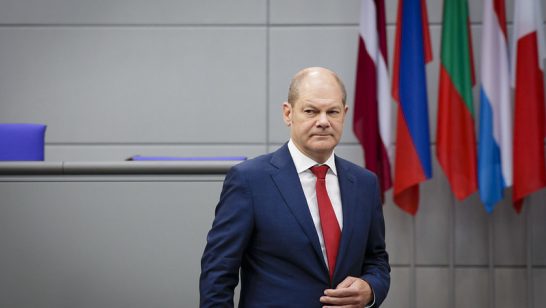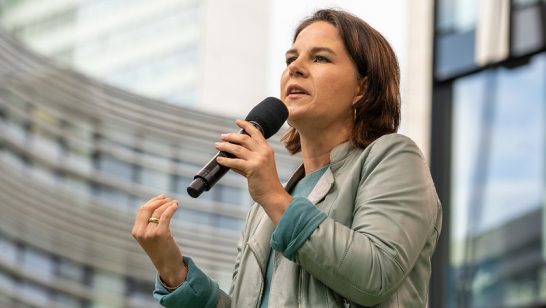
Completing the Nord Stream 2 pipeline project between Germany and Russia is a strategic mistake. In light of growing geopolitical tensions in Russia-West relations, Germany should prioritise European and transatlantic unity over a pipeline that would bring few tangible benefits for Berlin.
Seeking to improve relations with Moscow through economic interdependence, the Merkel administration has “compartmentalised” German foreign policy vis-à-vis the Kremlin by encouraging greater trade despite growing geopolitical differences. The contentious Nord Stream 2 pipeline is a case in point. Launched in 2015 by Gazprom and five European companies, the first pipe of the twin pipeline was completed on 4 June 2021; the second is due to be completed by August this year.
Despite US pressure and sanctions against the operating company, a Bundestag debate on 19 November 2020 showed that Nord Stream 2 enjoyed cross-party support. It was mainly Green Party MPs and the Free Democrats that were against the pipeline, arguing that Berlin needed to cancel the project because it would “contradict European climate goals” and increase German dependence on Russia.[1] Support for Nord Stream 2 in the Bundestag appears to echo public opinion: according to a May 2021 Forsa poll, 75% of Germans back the completion of the pipeline.
Supporters of Nord Stream 2 are mistaken
Proponents of Nord Stream 2 argue that the pipeline is necessary to “attain the goals of affordability, environmental protection and supply security in the energy sector.”
But the argument that Nord Stream 2 is likely to “contribute to reduced gas prices”, as the Alternative für Deutschland (AfD) (and supporters from other parties) claim, is not quite right. To be sure, simulations do suggest that Nord Stream 2 could lower gas prices for European consumers by between 8 and 25 billion euros per year.
But it is a fallacy to think that lower gas prices are guaranteed. At present, hopes of lower gas prices are only estimates that would come at a political cost: any savings will depend on the Kremlin’s goodwill. Nord Stream 2 might result in lower gas prices for several years, but these can’t necessarily be sustained when political tensions rise. Moscow has a track record of using gas and oil as an “energy weapon”: between 1992 and 2017, there were “at least 15 discrete instances where Russian entities used price and physical volume manipulation of crude oil or natural gas supplies—often amid political tensions—to pressure consumers located in Central and Eastern Europe and the former Soviet countries.” Why would the Russian playbook make an exception for Germany? So rather than ensuring German energy security, Nord Stream 2 makes Germany dangerously dependent on Russia; energy supplies could be changed at the whim of the Kremlin.
In any case, Nord Stream 2 is not necessary for German energy security. The existing pipeline capacity is more than sufficient to ensure supply. According to Marc Oliver Bettzüge, the director of the Institute of Energy Economics at the University of Cologne, “Germany is integrated into the European gas market, which has plenty of import capacity, both in terms of pipelines and liquid gas terminals. In this context, the NS2 project is a relevant, but no decisive addition to the energy supply in Germany.”
Proponents of Nord Stream 2 further claim that the pipeline will contribute to environmental protection because it “is a modern pipeline, reducing the general environmental footprint and the risk of damage through wear and tear or the use of outdated technology.” This argument is also unconvincing. Yes, Nord Stream 2 is “a modern pipeline,” but the construction of Nord Stream 2 has damaged natural ecosystems and undermines Germany’s commitment to reduce reliance on fossil fuels by 2050.
Wider implications of Nord Stream 2
Nord Stream 2 has caused a rift both between Germany and the United States, and Germany and EU partners, most notably Poland, France, and the Baltic states. The EU Commission is also sceptical, worrying about the further expansion of Gazprom’s dominant position in the EU markets and a weakening of the countries that currently provide transit routes for Germany’s gas imports. As one observer noted, “Nord Stream 2 will not bring new gas; it will simply divert gas from those other pipelines … to circumvent Ukraine and deny gas transit revenues to Kyiv.”
Considering that Nord Stream 2 offers no noteworthy benefits in exchange for weaker EU and transatlantic cohesion, the pipeline is a case of strategic miscalculation. The decision to construct Nord Stream 2 was taken in 2015 – a year after Moscow annexed Crimea. Thus, it was clear at this point that Russia was re-emerging as a geopolitical challenge for Europe.
Giving Russia leverage in this situation is a fundamental mistake. Hopes that Nord Stream 2 might improve Berlin’s relations with Moscow have not materialised: Nord Stream 2 has not stopped Russia from conducting cyberattacks against the Bundestag in 2015 and from hacking German MPs in 2021. Nor has greater interdependence with Russia through Nord Stream 2 deterred the Kremlin from heightening tensions in wider Russia-West relations, for instance when Moscow deployed thousands of troops to its border with Ukraine in April 2021. It is simply not possible to “compartmentalise” Russian aggression or Russia’s geopolitical objectives, which are incompatible with Germany’s proclaimed foreign policy aims of fostering multilateralism and the rule of law in international politics.
Reminiscent of West German attempts to achieve détente with the Soviet Union during the Cold War through a reconciliatory approach (ostpolitik), Chancellor Merkel’s efforts to improve relations with Russia through deepening economic cooperation have not been successful. While engaging Russia is important, it is equally important not to be complacent about the uncomfortable reality that Russia has once again emerged as a geopolitical challenge.
Berlin needs to realise that Nord Stream 2 furthers Russian aims of fragmenting the West: the pipeline drives a wedge between Germany and Austria on the one hand, and European and transatlantic partners on the other, and it undermines European strategic autonomy. Nord Stream 2 could also render the Ukrainian and the Belarusian-Polish gas pipelines less relevant, opening the door to Russian military action in Ukraine. None of this is in Germany’s interest.
Way forward
In an ideal world, Germany would abandon Nord Stream 2. Given that Nord Stream 2 is only a few weeks away from completion, and in light of the November 2020 Bundestag debate and supportive public opinion, this is very unlikely.
There are only bad options on the table at this stage. A moratorium and cancelling Nord Stream 2 would anger Russia. Ignoring Western criticism would foster the image that Germany is an unreliable ally. The least bad option is an idea advanced by Wolfgang Ischinger, a former German ambassador who is now the chairman of the Munich Security Conference: “to complete the construction of the pipeline while conditioning its use on EU decisions and Russian behaviour.”
The lesson of Nord Stream 2 is clear: the German public debate needs more realism. To continue pretending that Germany can increase its economic dependence on Russia at little to no geopolitical cost is naïve ostpolitik. While no one—myself included—desires another Cold War with Russia, politicians across the political spectrum would be well advised to embrace the uncomfortable and undesired reality that Russia has re-emerged as a geopolitical challenge to European security. This challenge necessitates European and transatlantic unity rather than a well-meaning but ill-fated German unilateralism that creates one-sided vulnerabilities.
[1] Some CDU politicians, such as Norbert Röttgen, had also warned in September 2020 that completing the pipeline “would encourage Vladimir Putin” to continue on the path of confrontation.
The author would like to thank Andreas Persbo, Jane Kinninmont, and Julia Berghofer for their helpful comments on a draft version of the text. I
The opinions articulated above represent the views of the author(s) and do not necessarily reflect the position of the European Leadership Network or any of its members. The ELN’s aim is to encourage debates that will help develop Europe’s capacity to address the pressing foreign, defence, and security policy challenges of our time.
Image: Wikimedia commons



